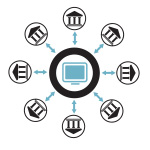Digital Single Windows
Civil servants can move any administrative procedure online within months
Users benefit from a simple, mobile interface
High income and lower costs for governments
Simple digital procedures increase

Creation or formalisation
of local businesses
of local businesses

Number of women
business owners
business owners

Number of young
entrepreneurs
entrepreneurs

Number of new formal
sector jobs
sector jobs
Timeline to digitalize a simple government procedure

Why it matters
Digital single windows help governments deliver quality services quickly and effectively to support policy objectives in areas such as mobilizing investment into climate change, jobs, environment food and health, while keeping interactions with citizens and entrepreneurs simple and online. Civil servants become tech savvy , and are redeployed to more productive work. Governments have data to improve policy and incentives.
By making government services easy and affordable, digital single windows significantly increase formal MSME creation and access to government by vulnerable populations, particularly among women, young and rural entrepreneurs. Formalisation in turn increases access to quality jobs and credit, and boosts tax revenue and social security coverage and increases economic resilience.
We have created an easy-to-use platform that allows civil servants to quickly build online public-facing services, with no IT assistance, so their governments can deliver on climate, jobs, environment, health and food. Here are some services being built right now.

Fighting climate change
Digital carbon registry and GHG emissions calculator to certify companies

Access to medicine
Digital delivery of pharmaceutical and vaccine production permits

Circular economy
Digital register for extended producer responsibility

Economic formalisation
Digital business registry enabling companies to be created online

Tax simplification
Digital accounting software for tax and social security filings

Trade for development
Digital information portals for importers and exporters
Case study
Starting a business in Benin
Before
Before the Benin digital single window was installed
Today
Today with the Benin digital single window, marketed by APIEx as monentreprise.bj
Queue at the APIEx development agency, fill in 5 paper forms and hand in up to 12 documents, including prior notarized copies.
Use any mobile phone to fill in an online form and scan 3 to 5 documents.
Pay fee by cash after queuing at the bank.
Use the same mobile to pay the fee with mobile money or credit card.
Collect certificates 5 days later from APIEx.
Receive certificates 2 hours later by email (fastest in the world).
28,800 companies registered in 2019
Company registration doubled in the two years following installation, one third by women, half by under 30s, half from outside the capital city. Project costs covered by additional fees.
How it works
Our digital single windows use the eRegistrations system, which is designed to digitalize simple or complex administrative procedures. It can be easily adapted and configured to any administrative process and may apply to procedures such as company registration, construction permits, export licenses or the transfer of a property title.
eRegistrations is suited both to operations involving only one administration (such as registering at the business registry) and to simultaneous operations at multiple administrations (such as registering a company at the tax office, with the municipal council, with social security, at the labour department and at the business registry).

User centric

Interoperable

Highly secure
The user’s journey when using our single windows
STEP 1
Provide data
The journey starts with an interactive guide that automatically determines which information is required as well as the corresponding cost and requirements, according to each user's situation.
The user fills in a customised online form that captures the data required by various agencies, uploads scanned copies of necessary documents, which even if required by several agencies are uploaded only once, and makes one online payment. The data and documents are stored on the user’s file in the database.
The user fills in a customised online form that captures the data required by various agencies, uploads scanned copies of necessary documents, which even if required by several agencies are uploaded only once, and makes one online payment. The data and documents are stored on the user’s file in the database.
STEP 2
Review
Officers at each agency log in and check the data and documents provided as required for their part of the decision-making and approval process. In case of missing or incorrect information they can contact the user.
In order to improve efficiency, the system can assist officers in identifying applications that meet all requirements or that may need further review. Automatic approval can also be enabled to speed things up further.
In order to improve efficiency, the system can assist officers in identifying applications that meet all requirements or that may need further review. Automatic approval can also be enabled to speed things up further.
STEP 3
Final approval
Once all approvals have been made, the user receives the relevant documents (authorisations, certificates of registration etc.).
Documents can be in digital form with QR codes and accessible in their online space, or in physical form to be collected from a government office or sent by post.
Documents can be in digital form with QR codes and accessible in their online space, or in physical form to be collected from a government office or sent by post.
Minimum technical requirements
Participating agencies do not require computerized systems. Government officers only need access to digital devices and can be fully mobile.
The system can either provide secure authentication or integrate with existing digital IDs and SSOs. A law on electronic signatures is not mandatory. However, eRegistrations can make use of electronic signatures in countries where it is regulated.
The system can integrate with existing credit card, mobile money, government or other payment platforms.
Data can either be stored on cloud servers (recommended for performance, backup and security purposes) or on a high spec physical server.
Beneficiaries
Digital Single Windows are available to any government and can be implemented within existing laws. They can be installed on nationally-controlled servers with a license for use in perpetuity and a full training package.
Explore our digital single windows
- Lomas de Zamora, Argentina
Business registration - Benin
Business registration - Bhutan
Business registration - Burundi
Business registration - Cameroon
Business registration - Cuba
Trade licensing
- El Salvador
Business registration - Guatemala
Business registration - Baghdad, Iraq
Business registration - Lesotho
Business registration - Mali
Business registration - Palestine
Business registration